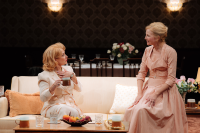Love Letters by A.R. Gurney began life as an epistolary novella about two childhood friends, Andy and Melissa, whose on-off romance is traced through an exchange of letters lasting 50 years. In 1988, the script was turned down by the New Yorker magazine: ‘We don’t publish plays.’ Gurney hired an actress, Holland Taylor, and together they performed the script in a public library. From there it transferred to Broadway in 1989. It’s a minimalist’s dream. There are no costumes, and no set, and the actors can read the script without rehearsing or memorising their lines. This makes it a popular choice for galas and charity events. Elizabeth Taylor staged a version with James Earl Jones in 2007 to raise money for her Aids foundation. In 1995, a production starring Lynn Redgrave was presented to the jury in the O.J. Simpson trial during their day off.
Andy and Melissa meet as children in New England where their families are neighbours. Andy is the dutiful son of a stuck-up dynasty with political connections. Melissa, whose forebears are seriously loaded, is a rebellious cynic who doesn’t care for social niceties. ‘You may not have as much money as us,’ she announces, ‘but you’ve got a better family.’ She vows to follow her mother’s advice about romance. ‘Meet as many boys as possible before you marry. That way you’ll make less of a mistake.’ When she tires of writing letters he stands up to her and refuses to switch to phone calls instead. ‘A telephone call is dead as soon as it’s over.’
It’s a rare treat to have to put in some effort from the stalls, and to make the connections, to fill in the blanks
The pair are clearly bound to become an eccentric but successful power couple. Andy’s unimaginative diligence would make an interesting contrast with Melissa’s energetic and flirtatious charm. She’d throw great parties and he’d see that the caterers were properly tipped. But destiny has other ideas. They marry elsewhere and start separate families, and yet their spiritual union continues. When Andy becomes a Republican senator, Melissa’s congratulations are laced with acid. ‘I love all politicians but I find Democrats better in bed.’ In later life, Melissa succumbs to alcoholism, which inflicts lasting damage on her family. Finally the affair is consummated but their short-lived fling turns sour and this too becomes a source of regret.
In Roy Marsden’s bare-bones production nothing at all happens on stage. The actors sit at writing desks, angled slightly away from each other, and deliver their lines with barely a glance between them. The complete absence of spectacle and movement shifts the burden of creativity on to the audience. And it’s a rare treat to have to put in some effort from the stalls, and to make the connections, to fill in the blanks and the silences. Both players are great. Jenny Seagrove captures the broken ebullience of the fading party girl hunting for one last adventure. Martin Shaw’s sorrowful grimace, like a rain-lashed saint above a cathedral door, perfectly embodies the play’s themes of vanished time and opportunities missed. With virtually no outlay this fantastic show could be filmed and broadcast by the BBC to brighten up the coming months. If it goes unrecorded, it faces the same destiny as a telephone call.
Pinter’s early play, The Dumb Waiter, features two armed thugs in the basement of a restaurant waiting for orders to execute an unknown victim. The script turns the dramatic conventions upside down by making a storyline out of inaction and inertia. Director Alice Hamilton delivers a doggedly faithful version. The set looks good, the outlaws are correctly attired in 1950s suits, and their accents are fine. But certain things have gone awry. Shane Zaza, confident, well-built and handsome, seems entirely miscast as the gormless young gangster Gus, whose irritating small talk provokes the fury of Ben, his older accomplice. Zaza doesn’t bother to show us Gus’s nervousness or boyish charm and instead he strides around the set with an air of lordly detachment like a millionaire architect visiting a Ferrari showroom. He looks like the type to hire an assassin rather than do the dirty work himself. Alec Newman gives a more convincing account of Ben, a fidgety, humourless, short-tempered thug.
The bungling killers pass the time making tea, discussing the newspapers and bickering like an old married couple. Their witterings are interrupted by a dumb waiter which descends from an upper floor with written orders for restaurant dishes. For obscure reasons, they feel obliged to obey these instructions and to rustle up a meal from their threadbare possessions. Result: a mild toot of comedy rather than a blast. The ending of this oft-revived drama involves a surprise twist so it doesn’t bear watching a second time. Hardly a classic, more an over-long and over-praised sketch routine. I took my 14-year-old son, who had never before seen Pinter on stage. ‘Any good?’ I asked. ‘Okay,’ he said. That about summed it up.








Comments